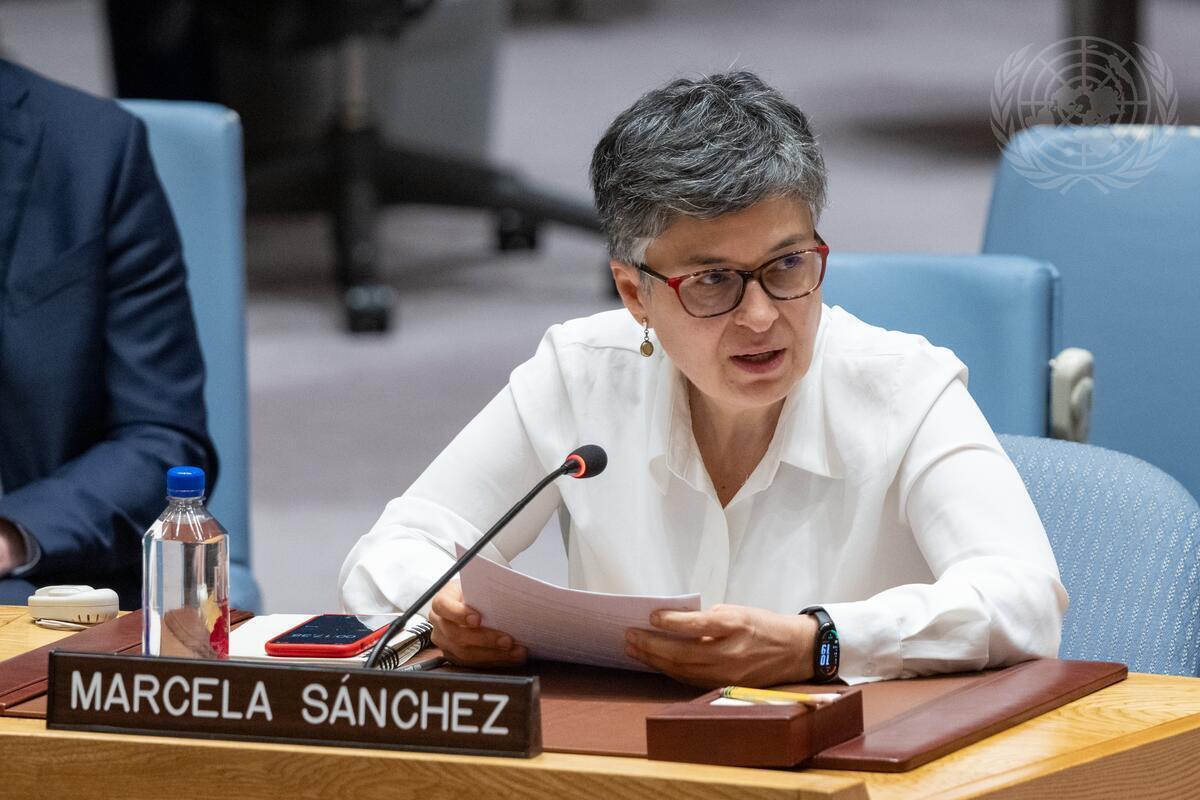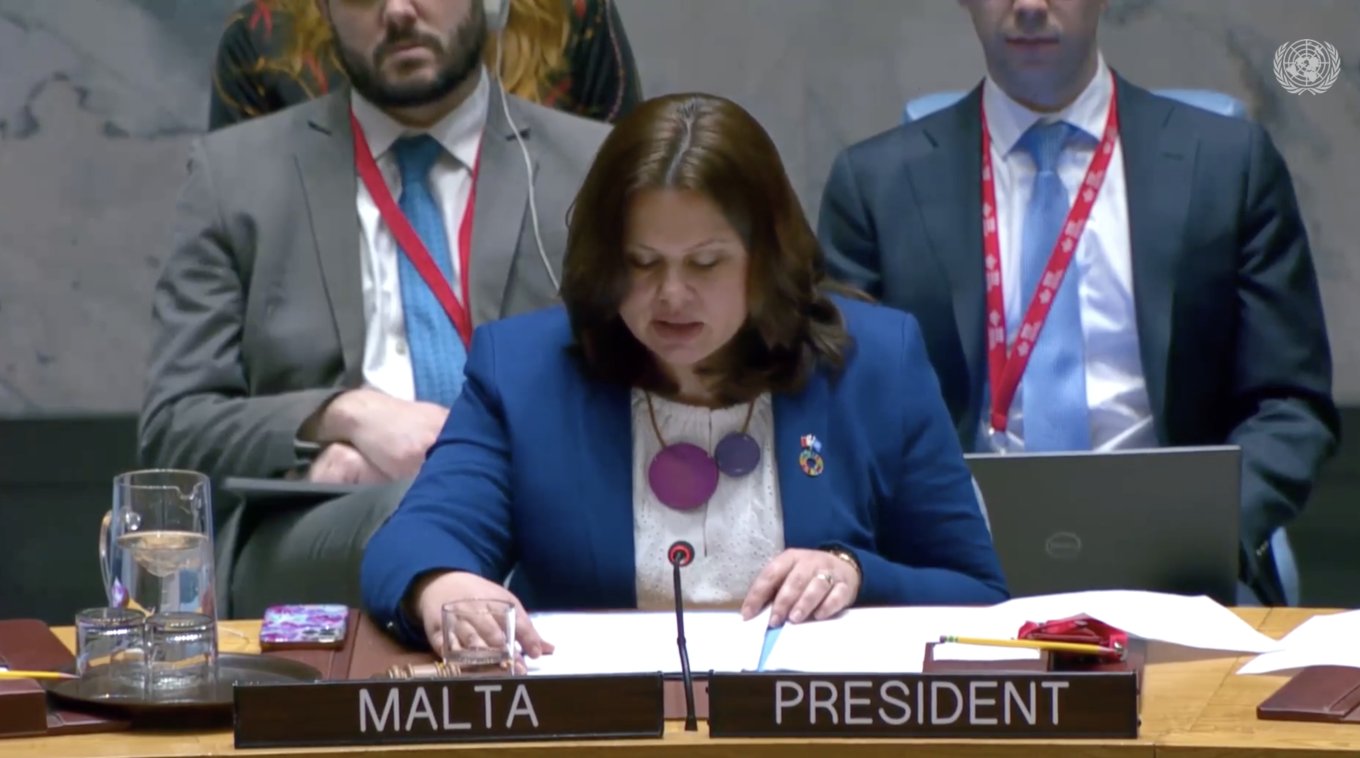
Insights
Queering the Security Council? An Uphill Battle, but Colombian Activists Push for Progress
Region(s)
TOPIC(s)
Type
Commentary
Author(s)
Publish Date
April 18, 2024
Share
On April 9, 2024, Marcela Sánchez, Executive Director of Colombia Diversa, told the Security Council: "Every attack against an LGBTQ person, every human rights defender killed, and every murder left uninvestigated sends the message that our lives are dispensable. I hope that today, this Council can send a powerful signal to the LGBTQ population in Colombia that their lives matter and that you will stand by your commitment to protect their rights."

Sánchez's message to the Security Council came as part of her intervention in the Council's consideration of the Colombian transition to peace after its 52-year internal conflict. Colombia Diversa, a leading organization in the defense of the rights of lesbian, gay, bisexual, trans, and queer (LGBTQ) people in Colombia, has been integral in ensuring that queer voices are included in the peace process. Her statement marked the first time in its 78-year history that the Security Council received a full briefing in a regular session on issues impacting LGBTQ people in a conflict setting.
In her statement, Sánchez focused on the impact of Colombia’s armed conflict on LGBTQ people and the opportunities offered by the Women, Peace and Security agenda - a series of Security Council resolutions addressing the gendered impact of conflict and inclusive peacebuilding - to address the harm done to LGBTQ people in Colombia and prevent further violence.
As Outright has argued, LGBTQ people are systematically targeted in conflict settings, and security, atrocity prevention, and peacebuilding mechanisms must reckon with this form of gender-based violence. Colombia Diversa has provided comprehensive documentation of violence against LGBTQ people during armed conflict and has shown that they continue to be attacked by armed groups due to their sexual orientations and gender identities. As Colombia Diversa has asserted, if transitional justice is to address the root causes of violence, it must look not just at the types of violence occurring during the conflict but also at why these acts were committed against particular groups of people. By doing so, justice mechanisms can identify a common motivation underlying crimes committed against LGBTQ people and women: to punish their non-compliance with gender norms and stereotypes based on how they look, love, and behave. In large part due to Colombia Diversa’s efforts, the Special Jurisdiction for Peace (also known as the JEP), Colombia's transitional justice tribunal, has become the first transitional justice tribunal to legally recognize this type of persecution on the basis of gender.
Sánchez made five recommendations to the Security Council:
- Demand the full, equal, and safe participation of women and LGBTQ people in implementing Colombia's peace agreement.
- End intimidation, attacks, and reprisals against LGBTQ persons, human rights defenders, peacebuilders, and civil society leaders.
- Implement the gender and ethnic provisions of Colombia's peace agreement, which emphasize justice for women, LGBTQ people, Afro-Colombians, and indigenous peoples.
- Support the work of the JEP, particularly in relation to Macro Case 11 on conflict-related sexual and reproductive violence, including violence based on sexual orientation and gender identity.
- Pressure Colombia to finalize and implement its National Action Plan on the implementation of the Women, Peace, and Security agenda, preserving existing references in the draft to the inclusion of lesbian, bisexual, and trans women in the peace process.
The issues Sánchez raised concerning peacebuilding and the ongoing targeting of LGBTQ people fall squarely within the Security Council's mandate to maintain international peace and security, cooperate in solving global problems, and promote respect for human rights. Nevertheless, the Security Council has been reticent to consider LGBTQ people's experiences during conflict. In 2015, the Security Council took a significant step forward by holding an Arria-formula meeting (an informal meeting of Security Council members) on ISIL's targeting of LGBTQ individuals in Iraq and Syria. In 2023, the Council held another Arria-formula meeting to discuss the integration of the human rights of LGBTI people into its work. While both of these meetings were important, they were not part of the formal work of the Security Council. As such, the briefing the Council received from Sánchez was a crucial step toward integrating LGBTQ persons’ rights during armed conflict into the day-to-day work of the Security Council and making good on commitments made during the 2023 Arria-formula meeting.
The government of Malta, which held the Security Council's rotational presidency for April, invited Sánchez to the briefing. Malta’s representative, Francesca Gatt, commended Colombia’s progress in implementing the final peace agreement and called for “concrete actions on the ground to ensure the peace agreement delivers transformative change and tangible results.” Gatt added that such transformative change “can only be achieved through the full, equal, meaningful, and safe participation of women, indigenous, Afro-Colombian, and LGBTQI+ persons.”

Colombia is widely recognized as a trailblazing example of inclusive peacebuilding. The Security Council's attention to LGBTQ persons in Colombia's transitional peace process could set a precedent for future peace processes. As Sánchez stated:
Think of Colombia as a laboratory for implementing the principles of equality, non-discrimination, and inclusivity that are so central to the Women, Peace, and Security agenda. Success or failure here could set an important precedent for the protection of LGBTQ rights elsewhere in the world. We hope this Council seizes the opportunity to lead by example.
We at Outright hope the Security Council will heed Sánchez's counsel.

Take Action
When you support our research, you support a growing global movement and celebrate LGBTIQ lives everywhere.
Donate Now